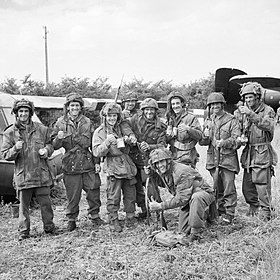Operation Needle Stack
This article is incomplete because it is pending further input from participants, or it is a work-in-progress by one author. Please comment on this article's talk page to share your input, comments and questions. Note: To contribute to this article, you may need to seek help from the author(s) of this page. |
| Operation Needle Stack | |||||||
|---|---|---|---|---|---|---|---|
| Part of the Asianna and the Pacific Campaign of the Second Europan War | |||||||
 Troops of the 6th Airborne Division in Hamcheon after securing the town. | |||||||
| |||||||
| Belligerents | |||||||
|
| |||||||
| Commanders and leaders | |||||||
| Units involved | |||||||
|
|
| ||||||
Operation Needle Stack (15 November - 29 November 1944) was a major airborne operation that took place in Joyonghea during the Third Joyonghean-Quenminese War. It was considered to be the operation that gave the Allies a dagger thrust towards the Quenminese lines. Vital objectives include securing key bridges at Anseong, Sinchang, Tanchon, and Kimchaek to provide a way for the XXX Corps to push through and take the city of Kimchaek, the last city before Chongjin.
The operation had two phases, Needle which was the initial airborne drops behind enemy lines. This involved dropping the Joyonghean 3rd Airborne Division, comprised of the 2nd Airborne Brigade and the 13th Parachute Chasseurs Regiment (1st Whiteford), at Sinchang, the 6th Airborne Division at Tanchon, and the 1st Airborne Division at Kimchaek. The 2nd phase was Stack, which was the attempt of the Third Rubrumian Army to march along the eastern flank and to reach the city of Kimchaek. Kurosawa shifted his plans that necessitated the deployment of the ZANACs and Joyongheans early in the battle. Following the capture of Anseong, ZANAC and Joyonghean forces marched further and engaged with enemy forces at Sinchang, and linking up with elements of the 2nd Airborne. Although the Imperials had attempted to destroy the bridge at Sinchang, the timely raid of the 3rd Airborne prevented this and preserved a crossing for the Allies.
The Allies continued to advance by the following day but as the XXX Corps advanced along the Sinchang-Tanseong Highway, they were ambushed by a combined force of 3 Quenminese armoured brigades and 2 Archadian regiments. This attack delayed Crocker's advance, making him unable to keep up with Kurosawa's advance along the seaboard. Crocker ordered his lead formation to assume engagement positions to prevent the Imperials from further threatening the advance. Over the course of a 4 hour battle, Crocker succeeded in preventing the Imperials from blunting his advance and he resumed his advance while Kurosawa was already nearing Tanchon.
Because of Crocker's delay, Kurosawa ordered a token force of Jutlanders to engage Imperial forces at Tanchon to attempt to relieve the 6th Airborne Division, ordering the ZANACs and Joyongheans under Samegawa to take the town. By 22 November, Samegawa's forces arrived at Tanchon, reinforcing the Lucian Paratroopers that had been engaging with the Imperials since 21 November. Samegawa fought tooth and nail to open the city for Crocker's XXX Corps. After taking key districts around the town, the Imperials were forced off Tanchon just in time for the XXX Corps to arrive by the following day. At that point, Kurosawa had arrived to find that the Lucian Paratroopers there had already suffered heavy casualties that his timely arrival had saved them from a route.
As nearly half of the Third Rubrumian Army were still making their way to the town, Kurosawa was forced to fight the control of the city defensively. The situation was made even worse when in 26 November, Count General Due sent in the 4th "Steel Tigers" and 105th Divisions to force Kurosawa's forces out of the city and end his advance. Kurosawa broke off a portion of his formation in the form of the Royal Regina Rifles and 2 battalions of the Royal Hamilton Light Infantry prevent the Imperials from further endangering the situation. For the next 2 days, the Reginas and the Hamiltons held the line as Kurosawa fought for the control of the city. By the early morning of 28 November, Crocker and elements of the XXX Corps could see Kimchaek just 10 kms away. Upon hearing of Kurosawa's situation, he wasted no time and ordered the 48th Armoured Division to relieve Kurosawa's forces. Brigadier Allone Grønkjær immediately sent in elements of Princess Raphtalia's Jutlandish Light Infantry to relieve the Reginas and Hamiltons fighting near the outskirts of the city. Simultaneous to this, upon hearing that Crocker's forces had arrived, Kurosawa ordered his forces to commence a counteroffensive on key districts around Kimchaek and force the Imperials out of the town. Soon, Due's formations found themselves overwhelmed and by 12 noon, they had been forced out of Kimchaek.
Small engagements took place further north of the city by the following day until the Imperials could no longer hold the line and were subsequently forced to retreat further north. The end of the Operation saw Kurosawa's march accelerating as he was already 50 kms away from Chongjin.
The operation became a major success for the Allies as it only served to accelerate General Kurosawa's march to the north by securing key cities and further splitting the Imperial forces in the east away from the main force located in the west of Joyonghea. This finally prompted Kurosawa to march to the northern border where the invasion of Churuongchandat simultaneously took place with the Battle of Chongjin, which ended Imperial presence in Eastern Joyonghea and leaving only the Northwestern region still under Imperial control.